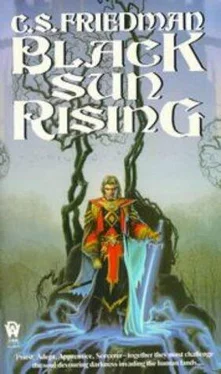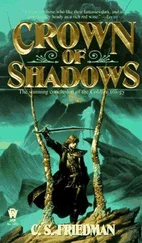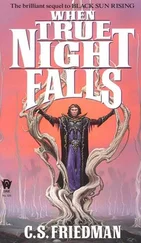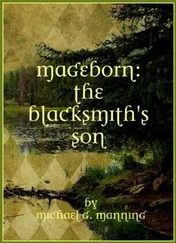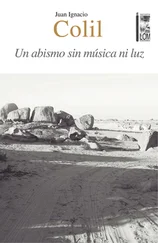Celia Friedman - Black Sun Rising
Здесь есть возможность читать онлайн «Celia Friedman - Black Sun Rising» весь текст электронной книги совершенно бесплатно (целиком полную версию без сокращений). В некоторых случаях можно слушать аудио, скачать через торрент в формате fb2 и присутствует краткое содержание. Жанр: Фэнтези, на английском языке. Описание произведения, (предисловие) а так же отзывы посетителей доступны на портале библиотеки ЛибКат.
- Название:Black Sun Rising
- Автор:
- Жанр:
- Год:неизвестен
- ISBN:нет данных
- Рейтинг книги:5 / 5. Голосов: 1
-
Избранное:Добавить в избранное
- Отзывы:
-
Ваша оценка:
- 100
- 1
- 2
- 3
- 4
- 5
Black Sun Rising: краткое содержание, описание и аннотация
Предлагаем к чтению аннотацию, описание, краткое содержание или предисловие (зависит от того, что написал сам автор книги «Black Sun Rising»). Если вы не нашли необходимую информацию о книге — напишите в комментариях, мы постараемся отыскать её.
Black Sun Rising — читать онлайн бесплатно полную книгу (весь текст) целиком
Ниже представлен текст книги, разбитый по страницам. Система сохранения места последней прочитанной страницы, позволяет с удобством читать онлайн бесплатно книгу «Black Sun Rising», без необходимости каждый раз заново искать на чём Вы остановились. Поставьте закладку, и сможете в любой момент перейти на страницу, на которой закончили чтение.
Интервал:
Закладка:
“I won’t hurt you,” he promised. And a hint of a smile crossed his face—as if his own benevolence amused him. “As for what you do to yourself, for having known me . . . that’s in your own hands. Now, I think, you’d better go home.”
She stepped back, suddenly uncertain. Dazed, as the fae that had bound her will dissolved into the night. He laughed softly, a sound that was disconcertingly intimate; she sensed a glimmer of darkness behind it, and for a moment she could see all too clearly what was in his eyes. Black fae, utterly lightless. A silence that drank in all music. An unearthly chill, that hungered to consume living heat.
She took a step backward in sudden panic, felt the wet grass bunch beneath her feet. “Nari!”
She whirled around, toward the source of the sound. Her father’s form was silhouetted against the glowing house, as he ran up the rise to reach her. “Narilka! We’ve been so worried!” She wanted to run to him, greet him, to reassure him—to beg for his help, his protection—but suddenly she had no voice. It was as if his sudden appearance had shattered some intimate bond, and her body still ached for the lover it had lost. “Great gods, Nari, are you all right?”
He embraced her. Wordlessly. She couldn’t have spoken. She clung to him desperately, dimly aware of the tears that were streaming down her face. Of her mother, running out to join them.
“Nari! Baby, are you all right? We didn’t know what to do—we were so worried!”
“Fine,” she managed. “Fine.” She managed to disentangle herself from her father, and to stand alone with some degree of steadiness. “It was my fault. I’m sorry . . .”
She looked back toward where her escort had last stood, and wasn’t surprised to find him gone. Though the grass was crushed where she had been standing there were no such marks from beneath his feet, nor any other sign of his passage. Again, no surprise.
“Fine,” she murmured that single word, how little of the truth it conveyed!—and she let them lead her home across the farmland, into the negligible safety of the light. And she mourned for the beauty that faded about her as the shadows of night fell farther and farther behind. But that vision would be hers now, whenever she dared to look for it. His gift.
Whoever you are, I thank you. Whatever the cost, I accept it.
Reluctantly, she let them lead her inside.
4
They used the river to gain the coast, though the swift-running water made them feel an equivalent of human nausea. One was lost at sea, caught up in Casca’s evening tide and swept far beyond any hope of earthly purchase before his companions could reach him. His companions mourned, but only briefly; he had known the risk, as all of them had, and had signaled his acceptance when he entrusted himself to the cold, treacherous waters. To mourn him now—or to mourn anyone, at any time—would run counter to their very nature. Regret was not in their vocabulary, nor sorrow. They knew only hunger and—possibly—fear. And that special fealty which bound them together in purpose, which demanded that they brave the ultimate barrier and walk the human lands, in service to another.
By dawn they had found caves to hide in, ragged hidey holes gutted out of granite cliffs by wind and ice and time. Below them the surf raged as tidal patterns crossed and tangled, Casca and Domina and Prima battling for dominance of the sea, while Sun and Core together ruled the sky. They slept as the dead sleep, oblivious to such liquid disputes, resting on mounds of newly killed animals, that of the caves’ former occupants. Whose flesh did not interest them as such, though they licked at the dried blood once or twice upon awakening, as if to cleanse their palates. What little food such animals could supply had been drained from them quickly the night before, in battle, and flesh without purpose offered these creatures little sustenance. And no pleasure. Humankind, on the other hand, could offer both: pleasure and sustenance combined, more than even the rakh could offer. They knew that. They had tasted. They hungered for more, and their hunger was powerful enough to take the place of courage when it had to. As it often had to in those nights that they skirted the sea.
After three and a half days—eight moonfalls—they sighted a light far out on the water, that revealed the presence of a small trading craft. Using flares they had brought for just such a purpose, they signaled a desperate cry for help. The sudden splash of green light against the black sky illuminated a small vessel, riding the waves with difficulty. An answering flare—life-orange, hot with promise—was sent aloft, and they watched with nightwise eyes as a small rowboat was lowered to the water, presumably to brave the deadly shoreline and, if possible save them.
Food! one whispered.
Not yet, another cautioned.
We have a purpose, the third reminded them both.
They stood shoulder to shoulder on the cold northern shore, as they imagined real humans might stand, and cheered on their saviors in desperate voices—exactly as they imagined real humans might do. All the while arguing, in whispers, the value of food versus obedience.
There’ll be humans enough once we reach the humlands, the wisest one among them pointed out—and they savored that thought, while the ship’s men braved rock and surf to reach the shore.
5
The interior of the boutique was small, and crowded with a tangle of hanging garments and treelike accessory displays; Damien had to push aside a rack of beaded belts to get far enough back from the mirror that the whole of his bulk could be reflected within its narrow confines.
He glanced at Ciani—who was managing not to smile—and then at the fluttering moth of a proprietor who picked at his clothes periodically, as though searching for pollen between the patterned layers. And back at the mirror.
And at last said: “I hope you’re joking.”
“It’s the height of fashion.”
The image that stared back at him was draped in multiple layers of purple cloth, each of a slightly different hue. The layered ends of vest over half-shirt over shirt proper, triple-tiered upper sleeves and cuffed pants—each in a different shade of plum, or grape, or lavender, some in subtle prints of the same—made him look, to his own eyes, like a refugee from some dyer’s scrap heap.
“What all of those in the know are wearing,” the proprietor assured him. He plucked at Damien’s vest front, trying to pull the patterned cloth across the bulk of the stout man’s torso. The thick layers of muscle which comprised most of Damien’s bulk had been further padded by the eastland’s rich foods and seductively sweet ale; at last the man gave up and stepped back, diplomatically not pointing out that fashions such as these were designed for considerably smaller men. “Subtly contrasting hues are the fashion this season. But if your taste runs more to the traditional, ” he stressed the word distastefully, as if to indicate that it wasn’t normally part of his vocabulary, “I can show you something with more color perhaps?”
“I doubt that would help.”
“Look,” Ciani was grinning. “You told me that you wanted to dress like a Jaggonath cleric—”
“A Jaggonath cleric with taste. ”
“Ah. You didn’t say that.”
He tried to glare, but the obvious merriment in her eyes made it difficult. “Let me guess. You got paid by some pagan zealot to make me look like a fool?”
“Now, would I do that?”
“For the right price?”
“I’ll have you remember I’m a professional consultant; First coin, sound contracts, reliable service. You get what you pay for, Father. ”
Читать дальшеИнтервал:
Закладка:
Похожие книги на «Black Sun Rising»
Представляем Вашему вниманию похожие книги на «Black Sun Rising» списком для выбора. Мы отобрали схожую по названию и смыслу литературу в надежде предоставить читателям больше вариантов отыскать новые, интересные, ещё непрочитанные произведения.
Обсуждение, отзывы о книге «Black Sun Rising» и просто собственные мнения читателей. Оставьте ваши комментарии, напишите, что Вы думаете о произведении, его смысле или главных героях. Укажите что конкретно понравилось, а что нет, и почему Вы так считаете.
